Long-term marine omega-3 fatty acid supplementation appears to produce a slight increased risk of incident depression compared to placebo
Long-term marine omega-3 fatty acid use results in a small, but significant increased risk of incident depression. This was the finding of a randomised, placebo trial by researchers from the Department of Psychiatry, Massachusetts General Hospital, Boston, US.
Depression is a major public health concern in older adults with an estimated prevalence of between 5 and 10%. Although higher consumption of fish has been associated with a reduced risk of depression, a 2016 systematic review which addressed marine omega-3 use in the elderly, found a non-significant reduction in depressive symptoms but recognised that this was based on only 9 studies. However, whether omega-3 fish oil supplementation could prevent depression remains uncertain.
The Vitamin D and Omega-3 Trial-Depression Endpoint Prevention (VITAL-DEP) study was designed to determine the effects on the prevention of depression and on the trajectory of mood symptoms associated with long-term supplementation of both vitamin D marine omega-3 fatty-acids among older adults. This was part of a wider trial designed to test the effects of vitamin D and fish oil supplements on the prevention of incident cancer and cardiovascular disease which recruited over 25,000 participants. The VITAL-DEP study included over 18,000 individuals with no currently clinically relevant depressive symptoms, core features of depression for two or more weeks within the past 2 years, current treatment for depression or major psychiatric or neurological conditions. All participants were randomised to marine omega-3 fatty acids (1g/of fish oil) or placebo and followed-up annually. The pre-specified co-primary outcomes were the risk of depression or clinically relevant depressive symptoms and longitudinal mood scores. A depression event was defined as a new, self-report of clinician diagnosed depression, treatment for depression or depressive symptoms based on the PHQ-8 questionnaire.
Findings
A total of 18,353 individuals with a mean age of 67.4 years (50.8% male) were randomised to long-term marine omega-3 fish oils (9171) or placebo and followed-up for a median of 5.3 years.
There were 651 cases of depression or clinically relevant depressive symptoms in the omega-3 group and 583 in the placebo arm giving a hazard ratio, HR of 1.13 (95% CI 1.01 – 1.26, p = 0.03). The mean difference in change between the two groups in PHQ-8 scores was not significantly different over the 5 year period and there were no significant differences between subgroups, apart from a slightly elevated risk of depression in women (HR = 1.26, 95% CI 1.08 – 1.47, P = 0.03).

Commenting on their findings, the authors reported that long-term marine omega-3 fish oil treatment led to a small, but statistically significant increased risk of depression and concluded that their findings do not support the use of fish oil supplements in older adults to prevent depression.
Citation
Okereke OI et al. Effect of Long-term Supplementation With Marine Omega-3 Fatty Acids vs Placebo on Risk of Depression or Clinically Relevant Depressive Symptoms and on Change in Mood Scores: A Randomized Clinical Trial. JAMA 2021

